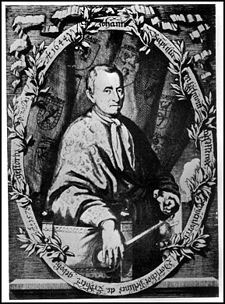1902 Encyclopedia > Jean Baptiste van Helmont
Jean Baptiste van Helmont
(also known as: Johannes Baptista van Helmont)
Flemish physician and chemist
(1579-1644)
JEAN BAPTISTE VAN HELMONT (1577-1644), was born at Brussels in 1577. He was educated at Louvain, and began the study of natural science under the Jesuits in that city. Their hard and dry philosophy, however, had few attractions for a nature so ardent and imaginative as his. Turning for relief to other systems, he found no rest except in the mysticism of A Kempis and Tauler. From them he learned that wrisdom is the gift of the Supreme Being, that it must be obtained by prayer, and that we must renounce our own will if we wish to participate in the influence of the divine grace. From this time he began a life of exemplary meekness aud humility, made over his property to his sister, and retired from the high society in which he had hitherto walked.

Jean Baptiste van Helmont
He devoted himself to the study of medicine, read carefully all that had been written on the science, and felt dissatisfied with its method and results. He then turned to Paracelsus and the alchemists, aud conferred a real boon on humanity by rescuing chemical science from the erratic absurdities of the post-Paracelsian alchemists, and applying to it more philosophical principles. He graduated as M.D. in 1599, and, after travelling through France and Italy, Switzerland and England, married a rich lady of Brabant, by whom he had several children. He died in Holland in 1644, in the sixty-seventh year of his age. Science is under real obligations to Van Helmont, though the greater part of his speculations present a curious mixture of mystical philosophy and acute chemical research. To him is due the invention, or at least the first application, of the term "gas" in the sense in which it is now used. He also discovered that gas was disengaged in abundance by the application of heat to various bodies, and during the solution of various carbonates and metals in acids.
Van Helmont's works were published at Amsterdam in 1648 by his son Mercurius; a more accurate and complete edition is that of Elzevir, 1652. The fullest account of his speculations is given in Rixner and Sieber, Beiträge zur Geschichte der Physiologie (1819-26), Hft. vii. See also Spiess, Helmont's System der Medicin, 1840; Rommelaere, Etudes sur J. B. v. Helmont, 1868. Van Helmont's mystical theosophy and alchemy appeared in even greater confusion in the works of his youngest son, Franz Mercurius, who was born in 1618 and died, after a somewhat adventurous and troubled life, at Berlin in 1699. His chief works are Cabbalah Denudata, 1677; Paradoxal Discourses, 1685; and Opuscula Philosophica, 1690. [--]
|
